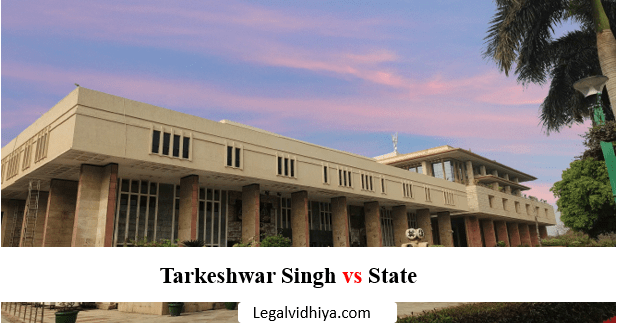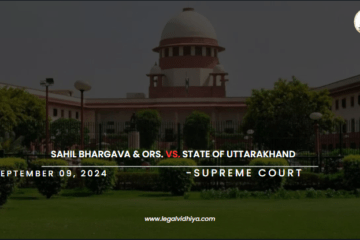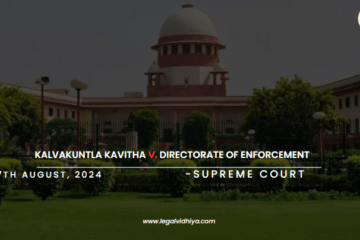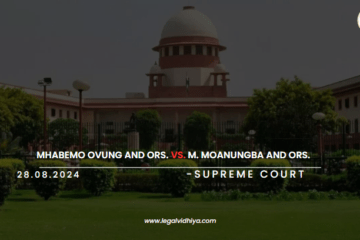
Tarkeshwar Singh vs State
| CITATION | Criminal Revision No. 237/2012 |
| DATE OF JUDGMENT | 5 October, 2012 |
| COURT | Delhi District Court |
| PETITIONER | Tarkeshwar Singh |
| RESPONDENT | State |
| BENCH | Sh. R.K. Gauba |
| REFERRED STATUTES | 190, 217, 221 IPC, 173, 200, 202, CrPC |
Facts of the case
An FIR was lodged u/s 363 IPC by ASI Karan Singh depending upon the complaint of Mr. Jitendra Singh alleging the rape of his 14-years old daughter (the prosecutrix) who had gone missing at 8:00 pm on 26/05/2011 and suspicion was casted on one, Ajay. During the investigation, the girl was recovered and presented twice, before the Hon’ble Magistrate, Ms. Namita Agarwal. The investigation indicated that the girl was not only kidnapped but also subjected to offences mentioned u/s 363/376/109/372/373/24/120B of IPC and Sections 4 & 5 of Immoral Traffic (Prevention) Act, and Section 23 of Juvenile Justice Act. Many people were accused during the course of investigation. On 30/04/2012, a compiled charge sheet was duly presented before the Magistrate, who in turn ordered the presence of IO. The Magistrate on a subsequent date held that there was a prima facie case and he took cognizance of the offences. The Court directed the production of accused Geeta before the Court, who was not arrested yet. After a few dates, Geeta was still not under arrest and the petitioner (IO) kept on delaying the arrest. On 21/06/2012, the Magistrate expressed dissatisfaction over the absence of IO at the Court, who still didn’t arrest Geeta and submitted an affidavit as reply.
Geeta is a prime-accused of the case as she was bought by the prosecutrix’s father at home, and was to be called as ‘mother’ and she is also accused of taking the prosecutrix at the place where, she was forced into prostitution and gang-rape by Pooja Panday and her husband. Although, IO stated his reasons but the Magistrate ordered that it appears that IO is intentionally disobeying the process of law by not arresting Geeta and an order was issued u/s 217 and 221 IPC. On another two hearings, dated 30/06/2012 and 06/07/2012, the petitioner did not appear before the court and this behavior was condemned as ‘evasive approach’ by the Magistrate. On same dates, the efforts being made by IO to find Geeta were confirmed by SI Harpal Singh. On 10/07/2012, the petitioner appeared before the Court and said that he is trying to arrest Geeta and that he did not violate any order of any court of law. The Magistrate strictly condemned this behavior and the way of investigation was being conducted by the IO and for the same, bail warrants in sum Rs. 25000 were issued against the petitioner.
Soon after, the counsel for petitioner, filed an application u/s 191 CrPC demanding the transfer of case from this Magistrate which was subsequently, unaccepted by the Magistrate. And, this petition has been filed against the grievances the petitioner has from the concerned Magistrate due to the accusations casted upon him u/s 217 and 221 IPC and the B/W issued against him.
Issues
Whether the omission to cause her arrest (Geeta) before submission of the charge sheet or during subsequent proceedings before the Magistrate on 01.05.2012 amounts to acts constituting offences under Section 217 and 221 IPC?
Arguments
The counsel for petitioner humbly submits that the Petitioner had no intention to abuse any process and that; he worked in accordance with all the laws.
Judgment
According to Section 190(1)(a) IPC, a Magistrate may take cognizance of an offence and reject or accept the complaint on the basis of sufficient grounds. According to section 154, it’s the police which must take action against cognizable offences initially and that, after registration of FIR, the officer is duty bound to investigate. A final report is then submitted to the Magistrate (Section173(1)). The investigation might not be complete and much interference and guidance from the judiciary should be avoided. In subsequent case, the Magistrate has applied his mind and he is not bound to accept the conclusions derived by the police. Section 191 rightly exists by allowing transfer of enquiry or trial before another Magistrate and that, the power of Magestrial court can be restricted through Section 197. Moreover, section 140 of Delhi Police Act, protects the petitioner from prosecution as a public servant except upon the ‘previous sanction of administrator’.
Moreover, the charge sheet had indicated that a supplementary report under Section 173 Cr.P.C. would be filed in the context of another accused Aarti and result of exhibits that had been sent to the Forensic Laboratory. This by itself means that the case was still subject matter of further investigation under Section 173(8) Cr.P.C. Also, section 217 requires the accused to have a correlation between disobedience and the ‘intention’ to ‘save someone’ from legal proceedings which couldn’t be derived here. Additionally, Section 221 mentions that the public servant must’ve Intentional omission to apprehend on the part of a public servant bound by law to apprehend an offender, if the offence be capital. And, that section 41 CrPC only empowers and not bounds an officer to make any arrest. It should and is generally assumed that any police officer made all necessary efforts to bring the offender on the hook. Moreover, since the petitioner was working under his many seniors, the obligation to arrest Geeta shouldn’t solely lie with him. The Magistrate during the course of investigation did not inform any issuance of ‘show cause notice’ against the petitioner. No inquiry or evidence collection also took place against the petitioner, which was a possible recourse u/s 200 and 202 CrPC. Putting the petitioner in such situations, would be a breach of Right to Self-incrimination u/a 20(3) Constitution of India. The failure to arrest cannot be comprehended as disobedience of law.
Lastly, after the issuance of ‘show cause notice’ the Magistrate asked the commissioner to initiate an inquiry against the petitioner under Conduct rules, subsequently leading to disciplinary action. The report was duly submitted to the Magistrate and it did not impress the substantial claims of the Magistrate against the petitioner. The Magistrate unreasonably did not follow up the report and discarded it on reasons of lapses and the credibility of the report due to the reason that the petitioner and the inquiry officer were batchmates.
Therefore, the petition stands allowed and the orders issued by the Magistrate against the petitioner were dismissed.
written by Disha Bhalla intern under legal vidhiya.




0 Comments